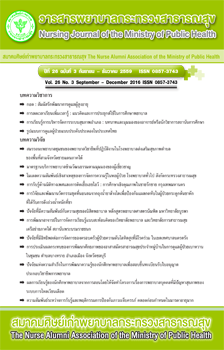การรับรู้ด้านมิติทางเพศและการติดเชื้อเอชไอวี: การศึกษาเชิงคุณภาพในชายรักชาย กรุงเทพมหานคร
Main Article Content
Abstract
บทคัดย่อ
การศึกษาเชิงคุณภาพ (Qualitative study) ครั้งนี้มีวัตถุประสงค์เพื่อศึกษาการรับรู้เกี่ยวกับ มิติทางเพศ และการติดเชื้อเอชไอวีในกลุ่มชายรักชาย กรุงเทพมหานคร กลุ่มตัวอย่างในการวิจัยเป็น ชายรักชาย ที่เข้ารับบริการ ณ คลินิกนิรนาม สภากาชาดไทย กรุงเทพมหานคร ระหว่างเดือนพฤษภาคม ถึง สิงหาคม พ.ศ. 2557 จำนวน 31 ราย เก็บข้อมูลโดยการสัมภาษณ์เชิงลึก (In- depth interview) ผลการวิจัยพบว่า กลุ่มตัวอย่างส่วนใหญ่เชื่อว่า รักแท้ไม่มีจริงในกลุ่มชายรักชาย ซึ่งส่งผลต่อการเปลี่ยนคู่นอนที่มากขึ้น ชายรักชายให้ความหมายของ เซ็กส์ คือ ความต้องการตามธรรมชาติที่ไม่อาจหลีกเลี่ยงได้ นอกจากนี้กลุ่มตัวอย่างยังสะท้อนว่าการติดเชื้อเอชไอวีสามารถดำเนินชีวิตได้อย่างปกติ โดยต้องการการยอมรับจากสังคม อย่างไรก็ตามประเด็นด้านความหวาดกลัวต่อการติดเชื้อเอชไอวีสามารถกระตุ้นให้กลุ่มชายรักชายตระหนักต่อการป้องกันและมีเพศสัมพันธ์ที่ปลอดภัยขึ้น ผลการวิจัยสนับสนุนว่าหน่วยงานทั้งภาครัฐและเอกชนควรมีการสนับสนุนการยอมรับผู้ติดเชื้ออย่างต่อเนื่อง การตีแผ่ผลกระทบของเอชไอวีทางสื่อต่างๆ ยังคงมีความจำเป็นต่อการปรับทัศนคติของชายรักชายต่อการป้องกันเอชไอวี
Perceptionof sexuality and HIV infection:
A Qualitative Study among Bangkok Chaay Rak Chaay(Gay men)
Praditporn Pongtriang *
Tippamas Chinnawong**
Anthony Paul O’ Brien ***
Jane Maguire ***
Abstract
This qualitative study sought to explore perception of Bangkok’s chaay rak chaay regarding sexuality and HIV infection. Thirty-one chaay rak chaay participants who used services at the Niranam Clinic, supported by The Thai Red Cross, took part in in-depth interviews between May and August, 2014. The findings indicate that most participants’ do not believe that true love exists in gay life and this was linked to many chaay rak chaay choosing to engage in multiple sexual partners. Participants’ also indicate that sex is a basis of life and gay men cannot live without sex. In addition, the participants’ reflected that although they may live with HIV, one can still lead a normal life and that this relies on the degree of social acceptance. However, fear of HIV infection can motivate chaay rak chaay to be more aware of HIV prevention and safe sex behaviours. The findings from this study suggested that both government and non-government organisations should continuously promote a social acceptance of HIV infected groups. In addition, the findings indicated that the impact of HIV infection needed to be promoted through media sites for the purpose of modifying chaay rak chaay’s perceptions and behaviours around HIV prevention.
Article Details
บทความและรายงานวิจัยในวารสารพยาบาลกระทรวงสาธารณสุข เป็นความคิดเห็นของ ผู้เขียน มิใช่ของคณะผู้จัดทำ และมิใช่ความรับผิดชอบของสมาคมศิษย์เก่าพยาบาลกระทรวงสาธารณสุข ซึ่งสามารถนำไปอ้างอิงได้

